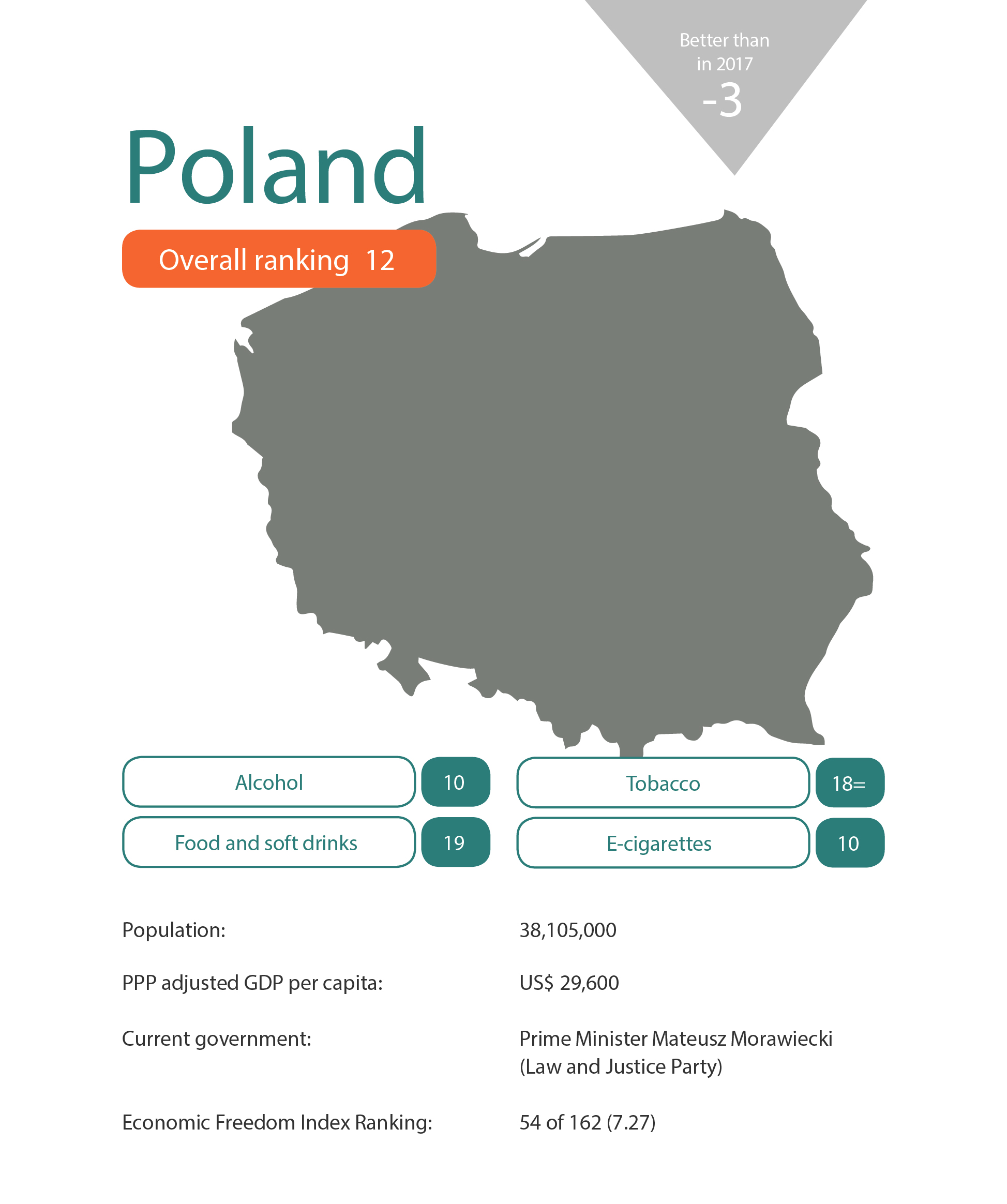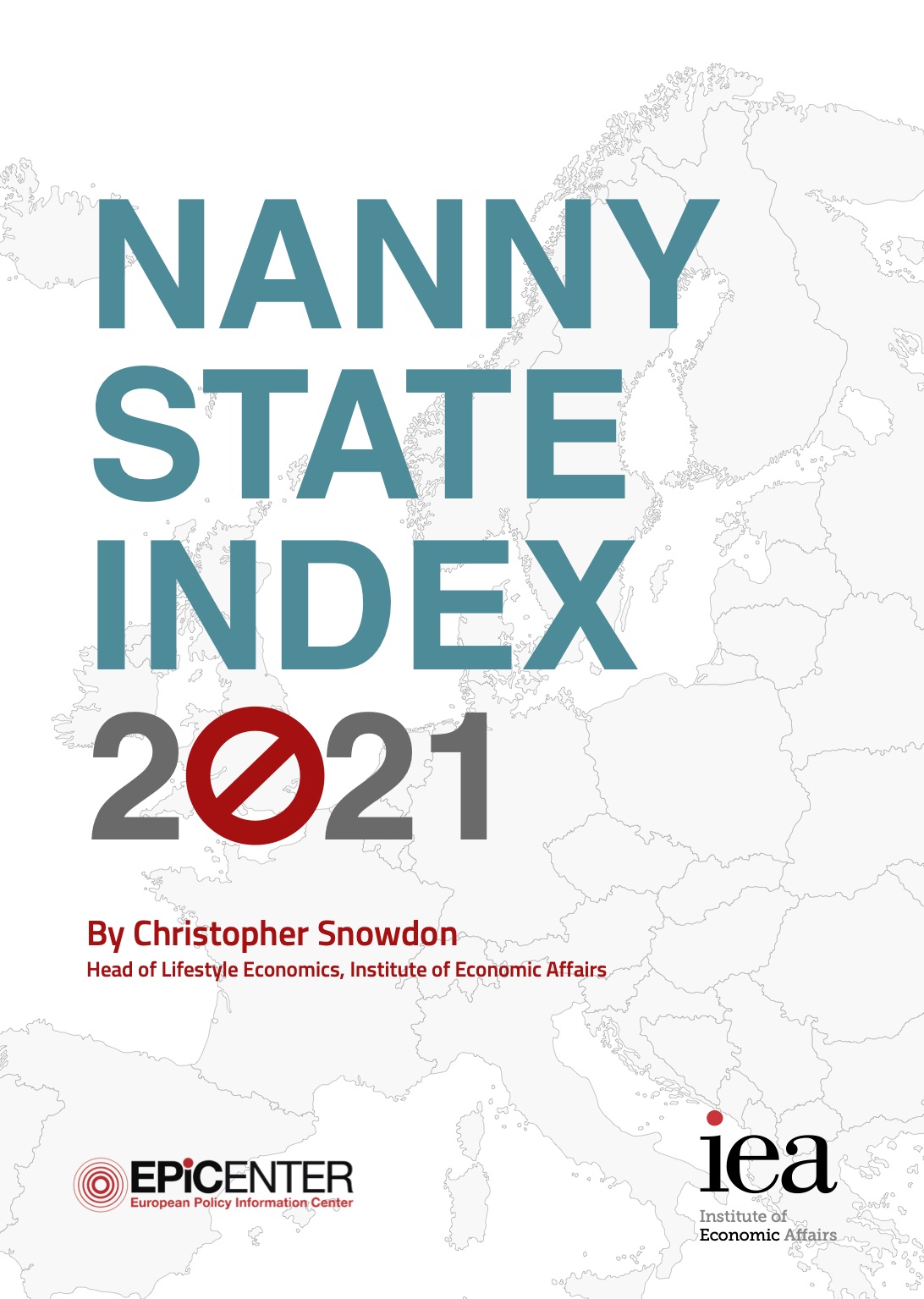
Like most countries in Eastern Europe, Poland takes a tough line on alcohol. Wine and spirits advertising is banned entirely and beer can only be advertised on television after 8pm. A bill to extend the beer advertising watershed to 11pm was drawn up by the Ministry of Health in 2017 but has not been passed. Drinking is illegal on streets and in parks unless municipal authorities specifically allow it in designated places. In February 2018, the government passed a law allowing local authorities to limit the number of liquor stores and restrict sales after 10pm.
Poland has a near-total ban on tobacco advertising and a ban on cigarette vending machines, but there is no display ban. It has a severe, but not total, ban on smoking in bars, restaurants and workplaces.
Sin taxes on alcohol and tobacco are fairly average for an EU country. In December 2017, the government passed a tax of 0.5 złoty (€0.12) per ml of e-cigarette fluid and a hefty tax on heated tobacco of 141.29 złoty (€34) per kilogram plus a 31.41% ad valorem tax. The vape tax was due to be introduced in January 2019 but has been delayed until June 2020.
Until recently, e-cigarettes could be used anywhere and were legal to buy and advertise, but in September 2016, Poland banned e-cigarette advertising, cross-border sales and vaping indoors in places where smoking is banned, including bus stops.
In September 2015 new restrictions on what can be sold in school shops and served in school canteens were introduced, leading to the closure of some outlets. It also led to many absurdities such as preventing schools from selling water in large bottles. Thanks to the new limits on salt and sugar in canteens, children sometimes do not want to eat their meals (or bring their own salt and sugar from home). There were even cases of students bringing illegal sweets and snacks to school and selling them to other students in a small black market.
At the beginning of September 2016, these rules were liberalised somewhat. Legislators still strictly define the amount of salt and sugar in food available for students as well as dictate what can be sold in school shops, but now allow certain products, such as buns and sweetened coffee. New limits on salt and sugar are slightly less restrictive. Poland’s Ministry of Finance and Ministry of Health have expressed interest in taxing so-called ‘junk food’ but fortunately nothing has come of this yet.
With thanks to the Civil Development Forum (FOR)
About
The Nanny State Index (NSI) is a league table of the worst places in Europe to eat, drink, smoke and vape. The initiative was launched in March 2016 and was a media hit right across Europe. It is masterminded and led by IEA’s Christopher Snowdon with partners from all over Europe.
Enquiries: info@epicenternetwork.eu
Download Publication

Previous version: 2019
Categories
About the Editor
Christopher Snowdon is the head of Lifestyle Economics at the Institute of Economic Affairs. His research focuses on lifestyle freedoms, prohibition and policy-based evidence. He is a regular contributor to the Spectator, Telegraph and Spiked and often appears on TV and radio discussing social and economic issues.
Snowdon’s work encompasses a diverse range of topics including ‘sin taxes’, state funding of charities, happiness economics, ‘public health’ regulation, gambling and the black market. Recent publications include ‘Drinking, Fast and Slow’, ‘The Proof of the Pudding: Denmark’s Fat Tax Fiasco’, ‘A Safer Bet’, and ‘You Had One Job’. He is also the author of ‘Killjoys’ (2017), ‘Selfishness, Greed and Capitalism’ (2015), ‘The Art of Suppression’ (2011), ‘The Spirit Level Delusion’ (2010), ‘Velvet Glove, Iron Fist’ (2009).
Poland 2019

Like most countries in Eastern Europe, Poland takes a tough line on alcohol. Wine and spirits advertising is banned entirely and beer can only be advertised on television after 8pm. A bill to extend the beer advertising watershed to 11pm was drawn up by the Ministry of Health in 2017 but has not been passed. Drinking is illegal on streets and in parks unless municipal authorities specifically allow it in designated places. In February 2018, the government passed a law allowing local authorities to limit the number of liquor stores and restrict sales after 10pm.
Poland has a near-total ban on tobacco advertising and a ban on cigarette vending machines, but there is no display ban. It has a severe, but not total, ban on smoking in bars, restaurants and workplaces.
Sin taxes on alcohol and tobacco are fairly average for an EU country. In December 2017, the government passed a tax of 0.5 złoty (€0.12) per ml of e-cigarette fluid and a hefty tax on heated tobacco of 141.29 złoty (€34) per kilogram plus a 31.41% ad valorem tax. The vape tax was due to be introduced in January 2019 but has been delayed until June 2020.
Until recently, e-cigarettes could be used anywhere and were legal to buy and advertise, but in September 2016, Poland banned e-cigarette advertising, cross-border sales and vaping indoors in places where smoking is banned, including bus stops.
In September 2015 new restrictions on what can be sold in school shops and served in school canteens were introduced, leading to the closure of some outlets. It also led to many absurdities such as preventing schools from selling water in large bottles. Thanks to the new limits on salt and sugar in canteens, children sometimes do not want to eat their meals (or bring their own salt and sugar from home). There were even cases of students bringing illegal sweets and snacks to school and selling them to other students in a small black market.
At the beginning of September 2016, these rules were liberalised somewhat. Legislators still strictly define the amount of salt and sugar in food available for students as well as dictate what can be sold in school shops, but now allow certain products, such as buns and sweetened coffee. New limits on salt and sugar are slightly less restrictive. Poland’s Ministry of Finance and Ministry of Health have expressed interest in taxing so-called ‘junk food’ but fortunately nothing has come of this yet.
With thanks to the Civil Development Forum (FOR)

 Austria
Austria Belgium
Belgium Bulgaria
Bulgaria Croatia
Croatia Cyprus
Cyprus Czech Republic
Czech Republic Denmark
Denmark Estonia
Estonia Finland
Finland France
France Germany
Germany Greece
Greece Hungary
Hungary Ireland
Ireland Italy
Italy Latvia
Latvia Lithuania
Lithuania Luxembourg
Luxembourg Malta
Malta Netherlands
Netherlands Norway
Norway Poland
Poland Portugal
Portugal Romania
Romania Slovakia
Slovakia Slovenia
Slovenia Spain
Spain Sweden
Sweden Turkey
Turkey United Kingdom
United Kingdom
















